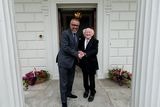Ireland needs to tax cigarettes more to join top anti-smoking countries, world conference told


Ireland needs to tax cigarettes more heavily if it wants to join the top tier of countries with the toughest anti-smoking measures.
This week, Dublin is hosting the World Conference on Tobacco Control, which was addressed by Taoiseach Micheál Martin yesterday, who as health minister, introduced the ban on smoking in public places in 2004.
However, the Global Tobacco Epidemic 2025 report, launched at the conference, said just four countries – Brazil, Mauritius, the Netherlands and Turkey – have implemented all the World Health Organisation’s (WHO) MPOWER tobacco control measures to reduce tobacco use, which is claiming more than seven million lives a year.
The measures include smoke-free air laws, help for people quitting, health warnings and making cigarettes less affordable than in 2014. Ireland falls down in not having taxes that meet the less affordable than 2014 measure.
It is one of seven countries just one measure away from achieving the full implementation of the MPOWER package, signifying the highest level of tobacco control, along with Ethiopia, Jordan, Mexico, New Zealand, Slovenia and Spain. The conference was told that, since 2007, 155 countries had implemented at least one of the tobacco control measures to reduce tobacco use at best-practice level. Today, over 6.1 billion people – three-quarters of the world’s population – are protected by at least one such policy, compared to just one billion in 2007.
Forty countries still have no MPOWER measure at best-practice level and more than 30 countries allow cigarette sales without mandatory health warnings.
“Twenty years since the adoption of the WHO Framework Convention on Tobacco Control, we have many successes to celebrate, but the tobacco industry continues to evolve and so must we,” WHO director general Dr Tedros Adhanom Ghebreyesus told the conference.
“By uniting science, policy and political will, we can create a world where tobacco no longer claims lives, damages economies or steals futures. Together, we can end the tobacco epidemic.”
The WHO report reveals that the most striking gains have come from graphic health warnings, one of the key measures under the Framework Convention on Tobacco Control (FCTC).
They are now required in 110 countries – up from just nine in 2007 – protecting 62pc of the global population, while 25 countries have adopted plain packaging.
The WHO warned, however, that enforcement is inconsistent, and smokeless tobacco packaging remains poorly regulated. The new report is accompanied by a new data portal that tracks country-by-country progress between 2007 and this year.
Join the Irish Independent WhatsApp channel
Stay up to date with all the latest news
















